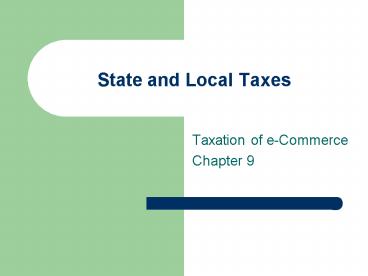State and Local Taxes PowerPoint PPT Presentation
1 / 17
Title: State and Local Taxes
1
State and Local Taxes
- Taxation of e-Commerce
- Chapter 9
2
E-Commerce
- The exchange of goods and services by electronic
means - Will likely top 1 trillion in economic activity
- Internet and e-commerce are becoming larger
contributors to the economy - Important to understand how this trend affects
government, businesses, and society
3
E-Commerce
- Taxation of cyberspace transactions
- State and local tax issues
- May require fundamental reform to deal with new
economy - Similar issues exists with Federal and
international trade - Congress has placed a moratorium on any new state
and local taxes over concerned that taxes could
choke off this growth sector
4
E-Commerce
- Internet Tax Freedom act of 1998 (IFTA)
- Enjoins state and local governments from imposing
multiple or discriminatory taxation on e-commerce
to access to the internet
5
The Internet and Internet Commerce
- Origins traced to 1960s DOD researchers
- E-commerce existed among a small group of
business partners - Software was cumbersome and hardware was
expensive - Private operators stepped in by 1995
6
Constitutional Limitations on the States Power
to Impose Taxes
- General Principles
- The micro-multinational form of business has
spawned - States power to impose tax is limited by
constitutional provisions - A state can impose tax on interstate business if
sufficient nexus under both Due Process and
Commerce Clause of U.S. Constitution - Landmark case was Quill Corporation v. North
Dakota (1992)
7
Constitutional Limitations on the States Power
to Impose Taxes
- The Theory of Agency or Attributional Nexus
- Taxing jurisdiction may assert nexus by
attributing to the taxpayer the presence of
another person or entity - Leading case was National Geographic Society v.
California Board of Equalization (1977) - Affiliate Nexus Theory
- The nexus of one corporation is attributed to
another under special circumstances - Some states try to bring consolidated groups
under its jurisdiction
8
Constitutional Limitations on the States Power
to Impose Taxes
- Nexus through Economic Presence
- Geoffrey Inc v. South Carolina Tax Commission
proposed that economic presence may be sufficient
for establishing nexus - A number of states have adopted South Carolinas
approach and require entities with an economic
presence within the state through intangibles to
pay the state income tax
9
State Sales and Use Taxes
- Cornerstone of state tax revenue bases
- Viewed by local governments as a reliable source
of revenue - Advantages are low rate, high yields, and limited
collection costs - Taxpayers frequently complain that there is
little consistency or coordination among the
states with regards to tax administration
10
State Sales and Use Taxes
- Problems applying these type of taxes to
e-commerce - Heavy dependence of sales and use taxes on
geographical and political borders - Determining the location (situs) becomes
difficult - Identity of the purchaser must be known
- Destination of the receipt and use of the goods
must be known - Multiple jurisdictions result in compliance
problems for the retailer
11
State Sales and Use Taxes
- Sales tax issues in Internet-delivered services
- Oklahoma Tax Commission v. Jefferson Lines
provides insight to tax issues with
internet-delivered services - A sales tax should be an un-apportioned tax
- The sales can be taxed measured by the gross
charge for the purchase without dividing the tax
base among the different state in which the
activities may occur - A sales of services is a local event
- Past decisions on the taxation of gross sales
receipts in the hands of a seller of services
adequately support the view that the taxable
event is local
12
State Sales and Use Taxes
- Sales tax issues in Internet-delivered services
- Applicability of Jefferson Lines to Cyberspace
- There was some local event, specifically the
agreement, payment, and delivery of some of the
services, in the taxing state. - Basic premise is challenged because cyberspace is
a world without geographical boundaries
13
State Corporate Income Taxes
- Questions raised ragarding the apportionment of
income to the various states - For multi-state corporations, states typically
use an apportionment formula comprised of a
payroll factor, property factor, and a sales
factor to determine the portion of taxable income - Complications arise from the sales factor related
to e-commerce
14
State Corporate Income Taxes
- Sourcing rules for tangible personal property,
intangible property, and services - Income-producing-activity Rule typically
all-or-nothing rule or pro-rata allocation rule - Destination-based Rule based on where the
services are consumed - Throwback Rule where sales into states where
sales of tangible personal property is not
subject to tax, states are required to source the
sale to the state from which the goods were
shipped
15
State Corporate Income Taxes
- Sourcing rules for tangible personal property,
intangible property, and services - Potential for Double Taxation some states tax
services based on where service performed and
some states tax on where the service is received
16
The Internet Tax Freedom Act of 1998
- One of the few times U.S. Congress ahs intervened
between private sector and state and local
governments - Key ingredients of act
- Placing a moratorium on certain taxes on the
Internet - Establishment of an Advisory Commission on
Electronic Commerce - Report of the Commission
17
E-commerce Taxation Much ado about nothing?
- Little empirical evidence on the likely effects
of taxing or not taxing e-commerce - Cline and Neubig estimate that sales tax not
collected amounts to one-tenth of 1 of total
state and local government sales and use tax
collections - Bruce and Fox estimate total revenue lost for all
states due to e-commerce is over 10 billion

